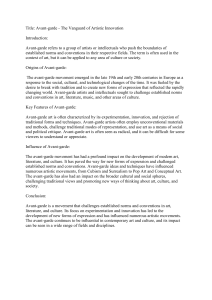Imperatives: A Cover Story Roberto Tejada
advertisement
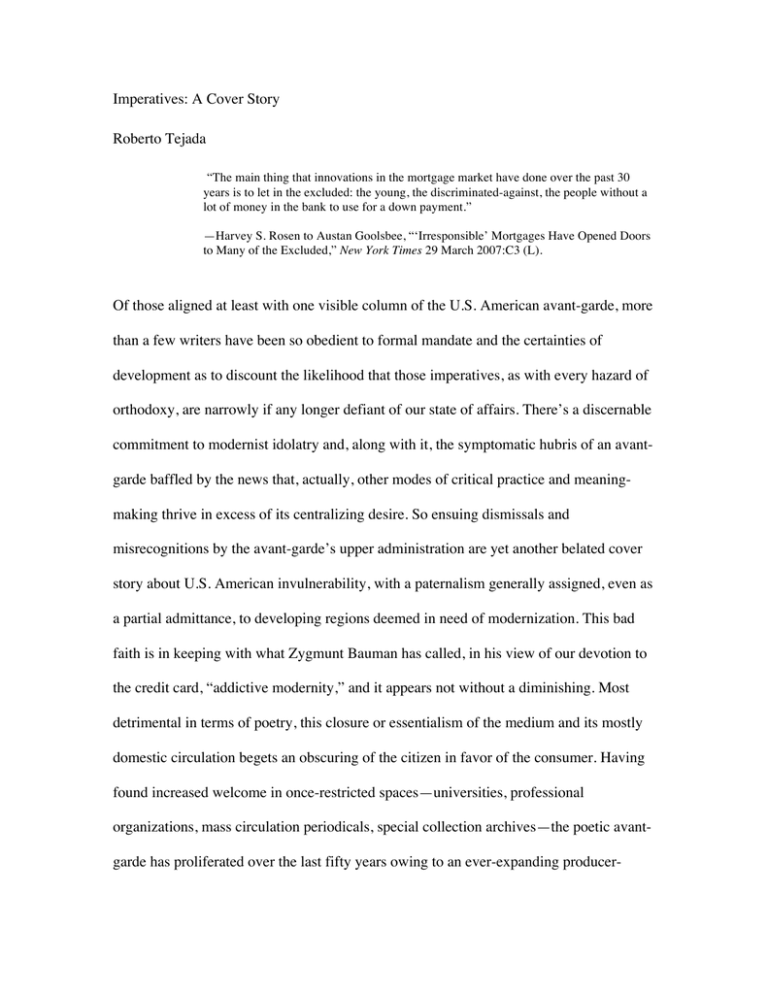
Imperatives: A Cover Story Roberto Tejada “The main thing that innovations in the mortgage market have done over the past 30 years is to let in the excluded: the young, the discriminated-against, the people without a lot of money in the bank to use for a down payment.” —Harvey S. Rosen to Austan Goolsbee, “‘Irresponsible’ Mortgages Have Opened Doors to Many of the Excluded,” New York Times 29 March 2007:C3 (L). Of those aligned at least with one visible column of the U.S. American avant-garde, more than a few writers have been so obedient to formal mandate and the certainties of development as to discount the likelihood that those imperatives, as with every hazard of orthodoxy, are narrowly if any longer defiant of our state of affairs. There’s a discernable commitment to modernist idolatry and, along with it, the symptomatic hubris of an avantgarde baffled by the news that, actually, other modes of critical practice and meaningmaking thrive in excess of its centralizing desire. So ensuing dismissals and misrecognitions by the avant-garde’s upper administration are yet another belated cover story about U.S. American invulnerability, with a paternalism generally assigned, even as a partial admittance, to developing regions deemed in need of modernization. This bad faith is in keeping with what Zygmunt Bauman has called, in his view of our devotion to the credit card, “addictive modernity,” and it appears not without a diminishing. Most detrimental in terms of poetry, this closure or essentialism of the medium and its mostly domestic circulation begets an obscuring of the citizen in favor of the consumer. Having found increased welcome in once-restricted spaces—universities, professional organizations, mass circulation periodicals, special collection archives—the poetic avantgarde has proliferated over the last fifty years owing to an ever-expanding producer- 2 consumer base, no longer sustainable as a single unified front. In one important sense, modernism cast a spell to fix the future at an endpoint in our relationship with the present as a process beholden to the past. Sweeping transformations today in the wake of global finance capital, intensified displacement, greater high-speed communication networks, and reverberating effects of these experiences on labor and value, have all but eroded the developmental time frame of modernism and its understanding of scale. To be sure, this ongoing historic process has yielded increasingly site-specific environments of impact and evaluation; and in these locations it has modified concrete and potential economies of imagined cultural status. If the modernist project and capitalism continue to associate as a shared repertoire of aspirations, certain cheerful inflections of avant-garde practice today appear so untroubled as to largely ape or disregard the symptoms of these deep-seated social transformations—and the role of the United States in that process. This omission speaks of a modernism complicit with “the long line of capitalist accumulation methods [that have] eventually exhausted its potential: once more capitalism, in the course of its expansion, has eaten up the milieu indispensable for its survival.”1 In this scenario, modernist methods for producing critical antagonism are readily subsumed as just another carefree aestheticism. Why not? If the crisis of the avant-garde is commensurate with the global downturn, with the perverse logic of credit boom and bust, then admission into the cultural marketplace is jeopardized by the expanding numbers thought to guarantee the cultural benefit of a few. In brazen pursuit of immediate gratification, advocates of formal innovation risk losing sight of modernism’s critical reason for being. There is vast range of poetic practices that so work in tandem with other forms of 3 knowledge as to provide contradictory pleasures and to hazard a diagnostic. This writing conveys the culture concept as a system of attitudes and instruction, human sensuous activity, the broadest environments of life as activations in the public sphere by means of a daydreaming embodied as intervals of contemplation and sense experience. If we measure the depth of Nietzsche’s claim that a word is only “a copy in sound of a nerve stimulus” and concept the “residue of a metaphor,”2 the political ante of the language art so escalates as to be more than an “internal relations” model for artistic change. This urgency compels us not only to redirect our assigned social scripts, but to set higher ambitions as to what can be said, in keeping with Stephen Greenblatt, about the “systemic organization of ordinary life and consciousness […], the pattern of boundary making and breaking, [and] the oscillation between demarcated objects and monological totality….”3 Inasmuch as I’ve lost faith in the sustainability of an avant-garde as a definable formation, especially in an expanding media environment of over-production and calculated obsolescence, I want writing to re-imagine citizenship today in terms that include a voluptuousness of the self and its overcast contingencies. In this, I seek to reconcile two expansive propositions that in many ways are incompatible. U.S. American minimalism, grounded in media specificity of its objects and the materiality of form, endures because it is well equipped to oppose artistic autonomy with the methods of mechanized labor and to remark the relationship of art and industry. Latin American neobaroque, an extension of historic surrealism, enacts a pageantry of seduction as public engagement, in interplays of violence and sensuality, with a view the social field not as system of fixed values, but as an irreverent open-ended archive of meaning. Central to the neo-baroque, Cuban modernist José Lezama Lima identified 4 difficulty as a motivating feature not in terms of mere representation or strictly formal effects. He viewed difficulty with optimism and as constitutive of the interpretive project, a defiance given to incite the potential for knowledge as the “ordering force” of “historic vision.” In this respect, difficulty requires thoughtfulness and the unique knowledge attained in the joyful labor of making things. Metaphoric language is difficult to the extent that our relationship to generosity, in the broadest sense, is likewise a problem. Psychoanalyst Adam Phillips and historian Barbara Taylor compel this question of closure and availability by asking why there exists a social contempt for kindness when it plainly produces pleasure. They submit this is because kindness, as a style of obedience to the life of others, and like metaphor, involves a loss of boundaries. 4 Dissolution of strictly formal imperative invites a more difficult reckoning with our investment in the medium. There is room for an ethos of carefulness in our era of increased mechanized labor, post-production, and outsourcing. Even as digital storage and retrieval facilitates rhetorical possibilities and methodological scale, as a tool it imposes limitations and calls for more nuanced technological imaginations to punctuate the proliferating cacophony of statistics, unwanted thoughts, and accidental association on the global network. Richard Sennett directly links the shifting relations of labor and workplace to manufacture. “If craftsmanship, with its vibrant tradition of … mastery of a particular skill, doesn’t constitute merit,” then in every incentive for innovation over self advancement “…you are constantly, as it were, walking away from your own commitments.”5 My desire is for careful energizing words to structure the astonishment that is our accountability to language, foresight, and gesture; when metaphoric language in the mediated world can so beckon into action—into experience and knowledge—as to prompt the unforeseen. 5 Constitutive of social space and cultural selfhood, the syllabic realism of metaphor obliges an urgent kind of carefulness that emboldens the critical imagination to alter our picture of the present and the shape of things to come. 1 Zygmunt Bauman, “Life on Credit,” Soundings (London, England), 41:1, 56. Friedrich Nietzsche, “On Truth and Lies in a Non-Moral Sense” in Philosophy and Truth; Selections from Nietzsche’s Notebooks of the Early 1870s, Atlantic Highlands, N.J.: Humanities Press, 1979, p 81. 3 Stephen Greenblatt, “Towards a Poetics of Culture” in The New Historicism, edited by H. Aram Veeser, New York, Routledge, 1989, p 8. 4 Adam Phillips, and Barbara Taylor, On Kindness, New York, Farrar, Straus and Giroux, 2009. 5 Richard Sennett, “What Do We Mean by Talent?” The Political Quarterly, Vol. 77, Issue Supplement, s1, 163-167, June 2006. [Italics added.] 2
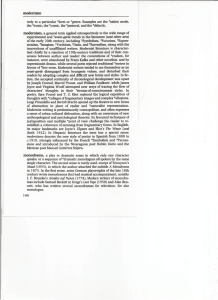
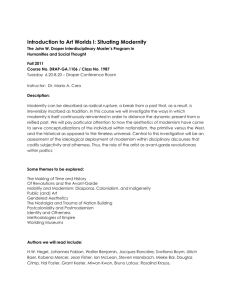
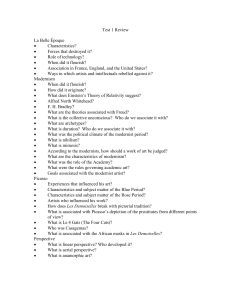
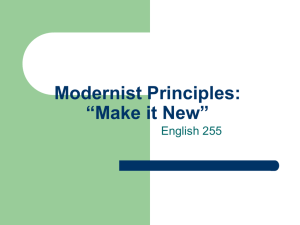
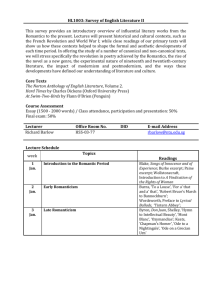
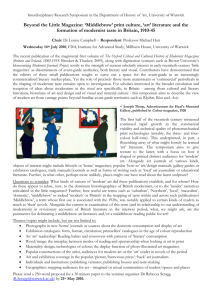


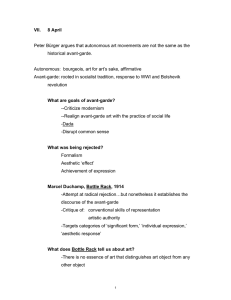
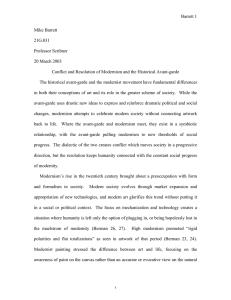
![X. 6 May Peter Bürger, Theory of the Avant-garde [1974]](http://s2.studylib.net/store/data/013519948_1-a43ac0ec8917bfe56e9b7a2469eae0f0-300x300.png)
